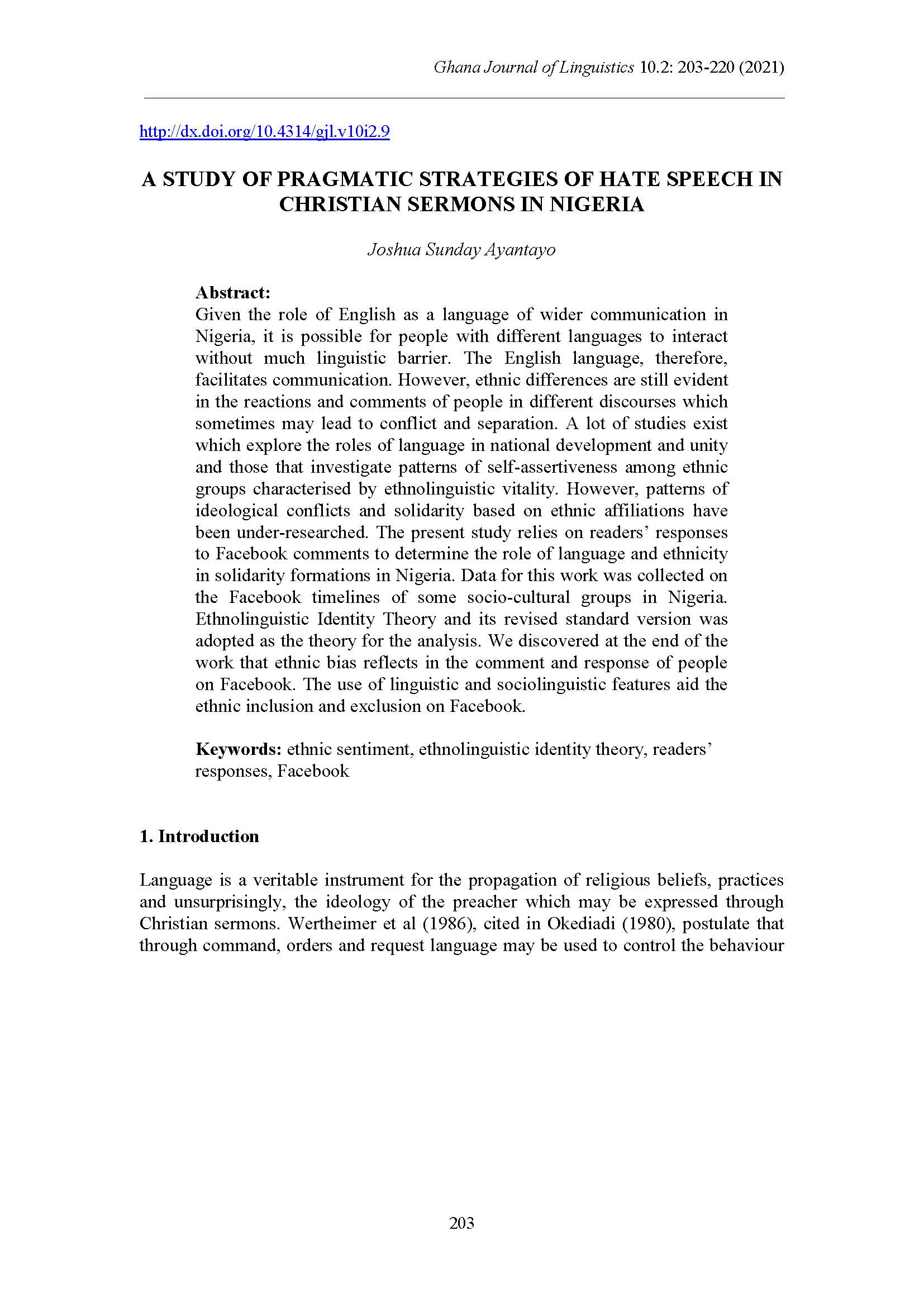A Study of Pragmatic Acts and Hate Speech Strategies in Christian Sermons in Nigeria
DOI:
https://doi.org/10.4314/gjl.v10i2.429Keywords:
pragmatic acts, religion, hate speech, sermons, speech acts, ideologyAbstract
Ideology loaded language may be used as instrument of control and for the production of hate speech and may be linked to the intensity of sectarian violence in contemporary Nigeria. This paper, therefore, evaluates the strategies for hate speech production in Christian sermons using Mey’s (1993) proposal on pragmatic acts, a modification of Austin (1962) and Searle (1969) speech act theories. Data, with two sermons from two well-known clerics and obtained from YouTube, has revealed that hate speech were produced through the pragmatic acts of innuendos and name-calling while set-up and co-option methods were deployed for audience participation. Whereas innuendos were linguistically realised as pronouns, name-calling takes the form of adjectives but function as nouns. Set-up and co-option were indirect linguistic strategies meant to empathise and attend to hearers’ face-needs. Pragmatic acts insulate preachers from backlash and highlight Nigeria’s social-political undercurrents. The enactment of hate speech in sermons justifies government initiatives in regulating religious activities.
References
Adegbija, E.E. (1982). A speech act analysis of consumer advertisements. (Doctoral thesis).
Indiana University, Bloomington.
Akhimien, Pius & Yetunde Farotimi. (2018). A study of the conversational features and discourse strategies in select sermons of Pastor E. A. Adeboye, American Journal of Linguistics, Vol. 6 No. 1, 2018, pp. 1-8. doi: 10.5923/j.linguistics.20180601.01.
Austin, J.L. (1962). How to do things with words. Jo Urmson and Marina Shisa (Eds). London: London. 1962.
Awonuga, C & L. Chimuanya. (2016). An investigation of the syntactic devices in selected
Nigerian preachers’Sermons. In Journal of English Scholars Association of
Nigeria.Vol. 18.1. pp. 110-125. 2016.
Babatunde, S. Timothy. (2007). A speech act analysis of christian religious speeches. In Style in Religious Communication in Nigeria. A. Odebunmi and A. O. Babajide (Eds.). pp 48-89.
Brown, Penelope and Levinson, Stephen. (1987). Politeness. Some universals in language usage. Cambridge: Cambridge University Press.
Fairclough, Norman. (2001). Methods in critical discourse analysis as a method in social scientific research. In R. Wodak & M. Meyer (Eds). Methods in critical discourse 2001 analysis (pp.121-128) London: Sage.
Halliday, M.A.K. (1978). Language as social semiotic: the social interpretation of language and meaning. London: Edward Arnold.
Levinson, Stephen. (1979). Activity types and language. Linguistics. 17: Pp 365-399.
Mey, J.L. (1993). Pragmatics: An introduction. Oxford: Blackwell Publishing.
Ndujihe, Clifford & Chukwumezie Udochukwu. (2018). Violent death: 1,351 killed in 10 weeks. https://www.vanguardngr.com/2018/03/violent-deaths-1351-killed-10-weeks/
Odebunmi, Akin. (2007). The stylistics of religious electronic media advertisements in
Nigeria. In Style in Religious Communication in Nigeria. A. Odebunmi & A. O. Babajide (Eds), 1-26.
Okediadi, N. (2008). Language aesthetics of prayers in modern pentecostal christian religion. African & Asia Studies. Retrieved from www.ajol.info/index.php/jrhr/
Searle, J. (1969). Speech acts: An essay in the philosophy of language. Cambridge: University Press.
Solomon, O.A. & G. Ibileye. (2016). The speech acts of a classical religion and national transformation. Journal of English Scholars Association of Nigeria.Vol. 18.1. pp 138-150.
Taiwo, Rotimi. (2007). Tenor in electronic media christian discourse in Nigeria. In Style in Religious Communication in Nigeria. A. Odebunmi and A. O. Babajide (Eds.). pp 90-106.
Oyedepo, Bishop. (2018). Bishop Oyedepo tells Buhari to resign. YouTube. Retrieved from https//www.youtube.com/watch?reload.

Downloads
Published
How to Cite
Issue
Section
License
Copyright (c) 2021 Abayomi Opeoluwa Ayansola

This work is licensed under a Creative Commons Attribution 4.0 International License.
The Ghana Journal of Linguistics is published by the Linguistics Association of Ghana, P. O. Box LG 61, Legon, Accra, Ghana.
LAG Email: linguisticsgh@gmail.com. Website: http://www.laghana.org
GJL Email: gjl@laghana.org Website: http://www.laghana.org/gjl
© Linguistics Association of Ghana and individual authors, 2023.
